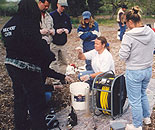Gillian Nielsen is Vice President of Nielsen Ground-Water Science, Inc. the parent company of The Nielsen Environmental E-School and The Nielsen Environmental Field School.  She is also Chairman of the International Certification Program for Environmental Samplers and Specialists. She has 37 years of International experience as an environmental and ground-water consultant and trainer. During her professional career she has developed, managed and implemented ground-water monitoring and sampling programs, soil gas monitoring investigations, multimedia environmental sampling programs, RCRA compliance audits, environmental site assessments and remediation programs at hazardous and non-hazardous waste sites in the U.S. and Canada. She has also played a key role in the development and management of corporate standard operating procedures as well as health and safety procedures and policies.
She is also Chairman of the International Certification Program for Environmental Samplers and Specialists. She has 37 years of International experience as an environmental and ground-water consultant and trainer. During her professional career she has developed, managed and implemented ground-water monitoring and sampling programs, soil gas monitoring investigations, multimedia environmental sampling programs, RCRA compliance audits, environmental site assessments and remediation programs at hazardous and non-hazardous waste sites in the U.S. and Canada. She has also played a key role in the development and management of corporate standard operating procedures as well as health and safety procedures and policies.
Gillian specializes in developing and instructing a wide variety of field practice-oriented training programs for private industry, consulting firms, state and Federal regulatory agencies, universities, professional and trade associations. She has lectured extensively and taught hundreds of field courses on the topics of ground-water monitoring and sampling, environmental sampling and field sample analysis, design and implementation of soil gas investigations and RCRA compliance throughout the U.S. as well as Canada, England, Guatemala, Mexico and Australia. Gillian also conducts 8-hour health and safety refresher training courses for clients across the U.S. who are involved in environmental contamination investigation and remediation projects. In addition to training, she works closely with industry and consulting firms as a consultant conducting audits of field investigation activities, negotiating with PRPs and regulatory agencies, developing corporate standard operating procedures and health and safety plans and providing technical reviews of site investigation reports. She also works closely with environmental instrumentation companies in the evaluation of new equipment and in development of new instrumentation.
Gillian was a 16-year member of the Editorial Board of Ground-Water Monitoring and Remediation and a member of the ASTM Subcommittee D-18.21 task group on ground-water sampling. She is the recipient of Ground Water Publishing Company's Outstanding Service Award for her work on the editorial board of the journal Ground-Water Monitoring and Remediation and has received several Standards Development Awards from ASTM. She has authored a number of scientific papers and written many ASTM Standards dealing with ground-water sampling, soil-gas monitoring, field analysis of environmental samples, and field decontamination procedures, and was a contributing author for first (1991) and second (2006) editions of The Practical Handbook of Environmental Site Characterization and Ground-Water Monitoring as well as Technical Guidance on Low-Flow Purging and Sampling and Minimum- Purge Sampling (2002). She is also a co-editor and contributing author of the text The Essential Handbook of Ground-Water Sampling, published in January 2007. Gillian frequently provides technical reviews of state and Federal regulatory agency technical guidance documents. Gillian holds B.Sc. degrees in geography (hydrology) and biology (aquatic) from Trent University in Ontario Canada.
